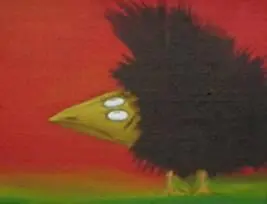Like a chauffeur, Rouvier came round to her side of the car, and helped her out. Then he assisted: carrying her bags to her car, and stowing them on the back seat. Neither of them looked at Annika’s cottage window as they worked. The small window that gave onto the sitting room.
When her stuff was in the car, Rouvier stooped. And kissed her hand, in an unselfconscious way. As he looked up, he said:
‘If you get really lonely, you must call me. We can drink a pastis in the excitements of Mende.’
‘Thankyou. It might be nice to do that. In the big city.’
There was another exchange of smiles, tinged with sadness. Rouvier opened his door, started his engine, and he was gone.
For a moment Julia stood, tense, in the faint drizzle; sensing the presence of the past. Then she climbed in her car and she briskly drove to the next village down the road. Les Combettes.
It took her just two hours to install all her stuff in her rented cottage. The kitchen of the little house had a good view of the stones. So did the window above her desk. Julia ignored the view: instead she sat down, took out her laptop, and put it on the desk, alongside a small bottle of water.
Her fingers were poised. She opened a new page, and typed the words:
Some Speculations on the Origins of Guilt and of Conscience in the Paleolithic Caves of France and Spain
For a second or two she stared at the words on her white laptop screen. Then she erased the sentence, and gazed at the blankness, at the drizzle on the windows, at the lawns and moors. A shaft of bleak sunlight had pierced the clouds; it shone down on the fields, making the sodden feather-grass sparkle, momentarily: a sudden harvest of jewels. She tried again.
The Sad Hands of Gargas: on the Origins of Human Guilt and Religion in the European Ice Age
Nodding to herself, she took a sip of water, and then she added three more words:
By Julia Kerrigan
Thanks are due to the many authors I have read, over the years, in the various subjects pertaining to the themes of this novel. In particular I owe a huge debt to Karen Armstrong, Nic Dunlop, Dith Pran, Haing Ngor, David Lewis Williams, Jean Guillaine and Jean Zammit, Steven A. Leblanc, Roland Neveu, Dave Grossman, Jean Clottes, Robert Wright, Jon Swain, Philip Short, Steven Pinker – and dozens of others.
My great friends and colleagues Peter Dench and Dan White, brilliant photographers both, have always been ready to tell me – over a warm beer in London, or a cold beer in Bangkok – just how wrong I am about almost everything. Without them, this book wouldn’t exist in any sensible form. I am similarly indebted to my editors Jane Johnson, Joy Chamberlain and Josh Kendall, and also to Coralie Saint-Genis.
Above all, I am grateful to the many people who helped with my more difficult research in China, Cambodia and Laos.
I’ll not forget the Hmong family who helped me as much as I helped them, when we were all stuck in the Laotian jungle one long muddy night. And thanks to Paksan for not being embarrassed when I nearly blubbed at the beauty of the snow mountains near Zhongdian. And I owe a debt of gratitude to the Lozère tourist authorities in France, and the guide who showed me around miraculous Gargas cave on that sunny day in late September.

Tom Knoxis the pseudonym of the author Sean Thomas. Born in England, he has travelled the world writing for many different newspapers and magazines, including The Times , the Guardian , and the Daily Mail . His first thriller was translated into twenty-two languages; he also writes on art, politics, and ancient history. He lives in London.
For more information visit www.tomknoxbooks.com
***

Конец ознакомительного отрывка
Купить книгу














